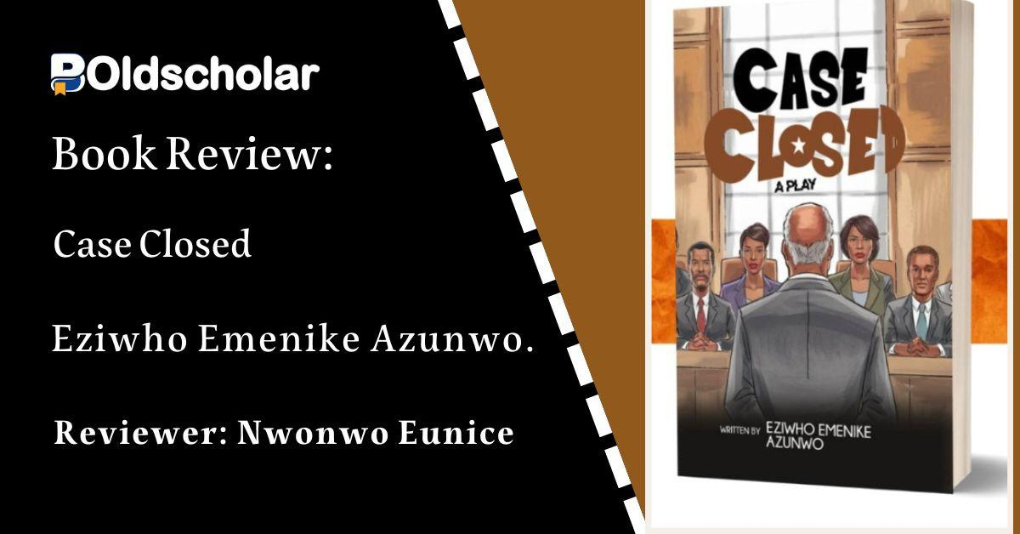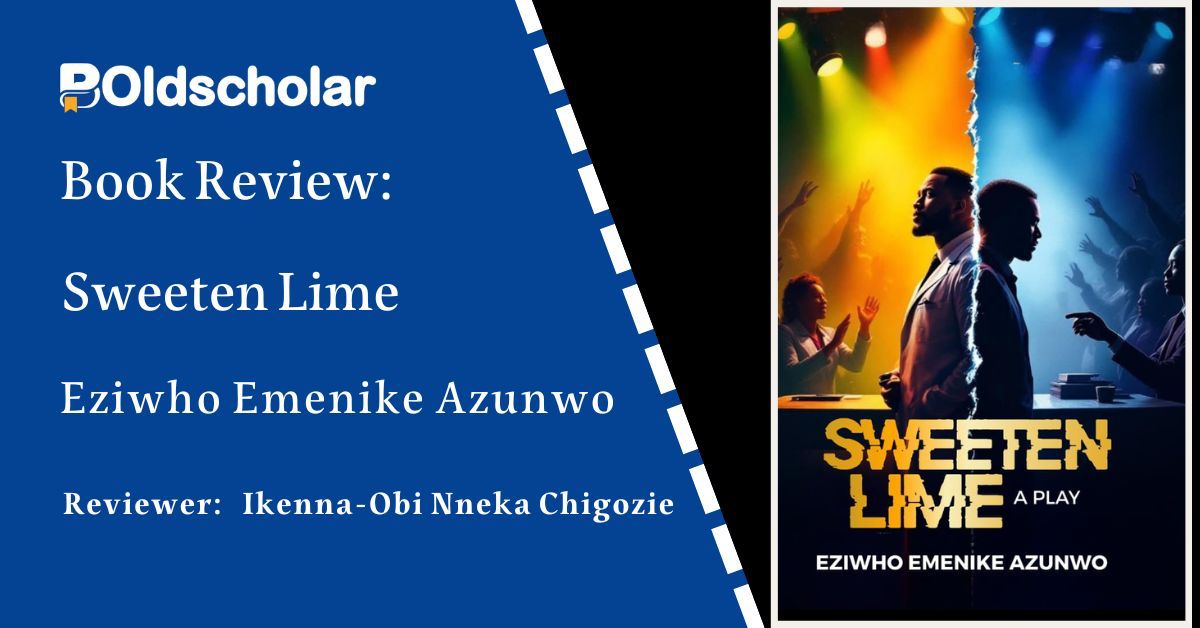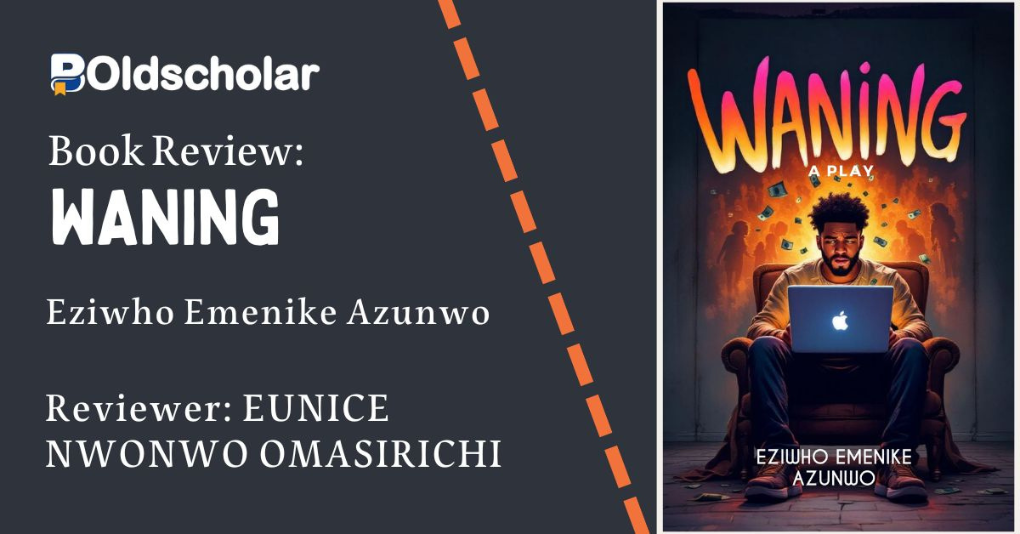Book Title: Case – Closed
Genre: Drama
Author: Dr. Eziwho Emenike Azunwo
Reviewer: Nwonwo Eunice
Publisher: Covenant Daystar Publishers
Pagination: (Number of pages) 65 pages
Year of Publication: 2025
Institution: Rivers State University, Port Harcourt
Department: Theatre and Film Studies.
Introduction
Case Closed, a stage play by Eziwho Emenike Azunwo, addresses the issue of sexual harassment in institutions of higher learning. It is a problem that has been going on for a while. The play is set in the the campus of a university environment; it talks about the abuse of power by a senior lecturer, and how that action results to emotional and mental problems on the victims, who are his students. It is painful because the students would become distracted. Although it this is a fictional story, it is not very far from the realities that female students experience and bear that most of them can talk about in many institutions of higher learning in the country.
Case Closed is not just a fictional tale, it serves as a mirror, reflecting the harsh realities faced by many in contemporary universities. Azunwo as a playwright has used the drama, through the comic, tragic satiric medium to expose and highlight a serious social issue with the passion in a bid to show how institutions in Nigeria have failed or are failing to uphold standards of morality and integrity.
The play begins with the author using humour as an effective instrument in drama to address serious themes like betrayal, abuse and accountability. Azunwo’s skill as an academic and storyteller comes alive in Case closed as he blends storytelling and teaching of morals making this drama both an entertainment and a content for deep reflection. He aims to show that the university environment is experiencing a high degree of imbalance between learning and and the promotion of immorality. The situation makes students to learn in an atmosphere of fear.
This play is a gripping and emotional story that brings to light the consequences of abuse of power within a university setting. It follows the journey of four female students who summon the courage to speak up against a lecturer, Dr. Ikechi Peterson - nicknamed “Dr. Trigger," who is accused of impregnating each of them under different manipulative circumstances. What begins as scattered whispers soon turns into a powerful confrontation before a university disciplinary panel. The story doesn’t just explore the misconduct of one man; it dives deep into issues like gender power imbalance, abuse in academic environments, institutional silence, and the long road to justice.
Synopsis
The story is about Dr. Ikechi Kenneth, nicknamed “Dr. Trigger;”a brilliant but morally bankrupt professor who has the habit of manipulating and sexually abusing his students. The story is narrated dramatically across six well-structured scenes, each building tension and revealing layers of deceit and abuse. The initial scene captures attention with dramatic lighting, vibrant backdrops, and rhythmic drumming that immediately draw the audience into a university environment.
Despite his attractive and captivating attitude, Dr. Trigger is exposed as a manipulative, unprofessional, and irresponsible person and lecturer. His female (victims) students Jessica, Tejiri, Alice, and Zainah are attracted into his web through false affection and academic coercion. As the story develops, the consequences of his actions begin to unravel, and his colleagues like Dr. Nwoko and Dr. Ebere confront him, warning of the repercussions of his immoral action.
As the case unfolds before the university’s disciplinary panel, led by Prof. Peter and supported by other panel members like Prof. Helen, it becomes clear that the institution is under pressure to act. When presented with the truth, Dr. Trigger finally admits he knows the girls. Though he never directly confesses to the pregnancies, his body language and responses reveal guilt. Eventually, the panel finds him responsible.
Trigger’s well deserved punishment, included a dramatic salary reduction to support the four students he had impregnated, served as a fitting conclusion to his immoral action. The resolution is satisfying and just because justice was served, offering closure and sending a strong message to institutions and offenders.
Characterization
The play features well-developed, believable characters that reflect real-world dynamics:
Dr. Nwoko and Dr. Ebere: Serve as voices of morality within the institution.
Prof. Peter and Prof. Helen: Represent institutional justice and ethics.
Dr. Ikechi Kenneth (Dr. Trigger): Both protagonist and antagonist, he is portrayed as charming but deeply unethical. The central figure, respected yet corrupt. He uses his power to manipulate students.
Zainab Abdul: Bold and fearless, she sets the tone for others to speak up.
Jessica Jumbo: Brings emotional depth; her account shows intimidation and threats.
Tejiri and Alice: Though they say less, they round out the evidence of repeated abuse.
Prof. Peter: A calm, just leader of the panel, pushing for truth.
Prof. Helen: Motherly but firm, she declares the final verdict.
Thematic Analysis
The play addresses a wide range of relevant and socially critical themes which include but not limited to:
Sexual Harassment and Abuse of Power: The play’s strongest theme, exposing how authority can be misused. This central conflict highlights how positions of authority can be misused and abused to exploit vulnerable students.
Emotional Trauma: The victims endure significant emotional stress and stigma.
Institutional Accountability: The University enforces justice through structured disciplinary mechanisms.
Justice and Redemption: The punishment of Dr. Trigger is portrayed as poetic justice. Reflected in the panel’s process and final decision.
Courage and Resistance and Truth: The students and ethical colleagues resist and confront abuse. Shows the bravery of young women speaking up together.
Gender and Victimhood: Highlights systemic victimization and the students’ resilience.
Denial and Acceptance: Dr. Trigger’s gradual collapse from denial to silent confession.
Language and Style
Azunwo utilizes a mix of easy to understand and elevated language that depict the academic and emotional contexts. The dialogue is direct and realistic, with emotional intensity that lead to confrontations, ironic defenses, and moments of levity to balance tone and maintain engagement. The students express pain, anger, and courage, while the panel stays calm and firm. The scenes build tension gradually, and traditional drums add cultural texture and a rhythm of justice.
Conclusion
Case Closed is a powerful and timely play that highlights the pressing issue of sexual harassment in higher education. Through compelling characters, structured plot lines, and realistic dialogue, Azunwo creates an impact in a narrative that challenges the audience to confront and question the abuse of academic power. Dr. Trigger’s downfall acts not only as narrative closure but also as a symbolic call for institutional reform and moral responsibility. The play does not just end with punishment, it ends with a lesson. A lesson to lecturers to respect boundaries. A lesson to students that they have a voice. And a lesson to institutions that silence or delay in justice is a betrayal to those they’re meant to protect.
Share this post





Don Kester
Good one. Congratulations.
chinwe
This review is splendid, however it is a true reflection of what is prevalent in our university system. It is not a fiction but real life predicament that denigrate and destroy the development of our educational system.
Daniel Victoria
Good job
Zorzor B. Callistus
Thank you for sharing this powerful piece. “Case Close: A Study of Sexual Harassment on Campus” is both eye opening and thought provoking. It sheds important light on a deeply sensitive issue that affects many students, often in silence. The research and narrative are compelling, and it calls for urgent attention and action. Well done!
AJAERO JESSE
I love the review and very interesting as it addresses the realities in our campuses today.